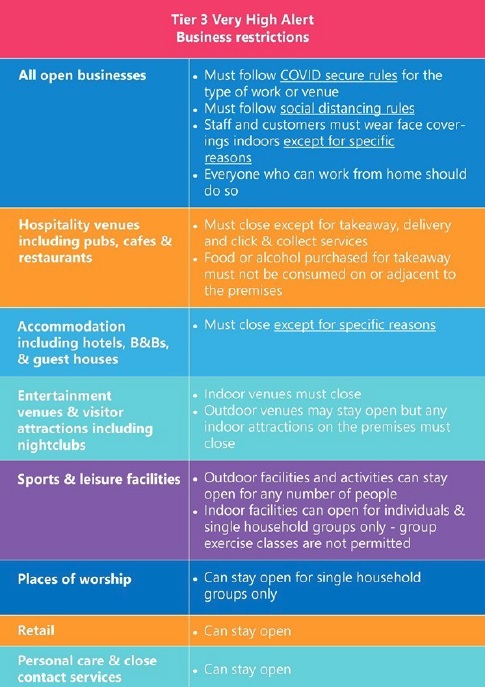
Information on new Tier 3 restrictions
Quick guide to new Tier 3 Restrictions
All open businesses
- must follow COVID secure rules for the type of work or venue
- must follow social distancing rules
- staff and customers must wear face coverings indoors except for specific reasons
- everyone who can work from home should do so
Hospitality venues including pubs, cafes and restaurants
- must close except for takeaway, delivery and click and collect services
- food or alcohol purchased for takeaway must not be consumed on or adjacent to the premises
Accommodation including hotels, B&Bs and guest houses
- must close except for specific reasons
Entertainment venues and visitor attractions including nightclubs
- indoor venues must close
- outdoor venues may stay open but any indoor attractions on the premises must close
Sports and leisure facilities
- outdoor facilities and activities can stay open for any number of people
- indoor facilities can open for individuals & single household groups only group exercise classes are not permitted
Places of worship
- can stay open for single household groups only
Retail
- can stay open
Personal care & close contact services
- can stay open
Detailed advice and links for Tier 3
Businesses and Venues
As well as specific exemptions set out below, any closed business can remain open for:
- providing essential voluntary services or urgent public support services, including the provision of food banks or other support for the homeless or vulnerable people, blood donation sessions, support in an emergency
- for the making of a film, television programme, audio programme or audio-visual advertisement
- for the purpose of voting or related activities
Hospitality
Hospitality settings, such as bars (including shisha bars), pubs, cafes, restaurants, and social clubs must close except for takeaway, delivery and click and collect services. This includes restaurants and bars within hotels or member’s clubs. Exemptions apply for the following settings:
Cafes and canteens at:
- hospitals, care homes, or supported housing as part of extra care schemes
- schools and providers of post-16 education and training, such as further education colleges
- higher education accommodation, and at higher education providers (where there is no practical alternative for staff and students to obtain food and where alcohol is not served for consumption on the premises)
- criminal justice accommodation or immigration detention centres
- naval/military/airforce or MoD facilities
- workplace canteens (where there is no practical alternative and where alcohol is not served for consumption on the premises)
Services providing food or drink to those experiencing homelessness can also remain open.
Businesses and venues selling alcohol for consumption off the premises can continue to do so as long as this is through takeaway, delivery service, click-and-collect or drive-through
Food or alcohol purchased from a hospitality premises via takeaway or click-and-collect may not be consumed on any part of that premises, including beer gardens, as well as adjacent seating to the premises (with exceptions for motorway service areas, airports, seaports, the international terminal at Folkestone and public transport services although these places cannot sell alcohol after 11pm).
Businesses must not provide shared smoking equipment for use on the premises.
Accommodation
Accommodation such as hotels, B&Bs, campsites, holiday lets and guest houses must close. These premises can only open for a person, who:
- is unable to return to their main residence
- uses it as their main residence
- needs it while moving house
- needs it to attend a funeral, linked commemorative event or following a bereavement of a close family member or friend
- is isolating themselves from others as required by law
- is an elite athlete (or their coach) and needs it for training or competition
- needs it for work purposes, or to provide voluntary or charitable service
- was staying there immediately before the area entered Tier 3
- needs it to attend education or training
- is a carer for someone they live with and is seeking respite
- needs to attend a medical appointment or treatment
They can also open:
- to enable voting, including an overseas election
- as a women’s refuge or a vulnerable person’s refuge
- for any purpose requested by the Secretary of State, or a local authority
Businesses that remain open in law, but are located within accommodation, such as a spa within a hotel, can remain open.
These restrictions on accommodation do not apply between 22 to 28 December 2020. This means that accommodation may open during this period for people to stay in order to be located near their Christmas bubbles. However other restrictions, such as those on hospitality and social contact still apply – so people cannot mix with their Christmas bubble in a hotel, for example, unless a member of their bubble lives their permanently. Please see separate guidance for more information on the rules for social contact during the Christmas period (23 to 27 December).
Closed entertainment venues and visitor attractions
The following entertainment and tourist venues must close:
- indoor play centres and areas, including inflatable parks and soft play centres and areas (other than for people who have a disability)
- trampolining parks (other than for elite athletes, people with a disability, supervised activities for children and for formal education or training purposes)
- casinos
- bingo halls
- bowling alleys
- indoor skating rinks (other than for elite athletes, professional dancers and choreographers, people with a disability, supervised activities for children and for formal education or training purposes)
- amusement arcades and adult gaming centres
- nightclubs and adult entertainment venues
- laser quests and escape rooms
- cinemas, theatres concert halls – other than drive-in events, broadcasting performances, training or rehearsal
- circuses
- snooker and pool halls (other than for elite athletes)
At the following outdoor entertainment venues, the indoor attractions must close:
- zoos, safari parks, and aquariums
- other animal attractions including farms
- water parks and aqua parks
- model villages
- museums, galleries and sculpture parks
- botanical or other gardens, biomes or greenhouses
- theme parks, fairgrounds and funfairs
- adventure playgrounds and parks, including ziplining
- visitor attractions at film studios,
- heritage sites such as castles, stately homes or heritage railways
- landmarks including observation wheels and viewing platforms
Other restricted venues
Conference centres and exhibition halls are closed for the purposes of hosting conferences, exhibitions, trade shows, private dining events or banquets
Venues which can remain open
The following outdoor venue can remain open:
- outdoor tourism and entertainment venues can remain open subject to following the relevant rules and guidelines
- outdoor cinemas, theatres and concert venues can remain open for drive-in only, but must close at 11pm, other than for the purposes of concluding a performance which began before 10pm
- outdoor events, such as funfairs can continue to happen in line with COVID-secure guidance – other than large outdoor performance events (performances, shows and screenings), which must be drive-in only
- leisure and sports facilities may continue to stay open, but group exercise classes (including fitness and dance) should not go ahead
- retail premises may open, other than shops situated inside closed premises that cannot be accessed directly from the street – retail premises within accommodation may also stay open
- personal care and close contact services such as hairdressers and barbers, beauty salons, tattoo parlours, nail salons, spas and beauty services, saunas, steam rooms, massage parlours and tanning salons can remain open.
- community centres and halls, and libraries can remain open. Group events should not take place, unless there’s a specific legal exemption to the social contact rules e.g. support groups, supervised activities for children.
- recycling and waste centres, car parks, and public toilets may continue to stay open
All businesses and venues should follow COVID-secure guidelines to protect customers, visitors and workers.
In certain indoor settings, staff and customers must wear face coverings, unless they have an exemption.
Businesses must ensure that if their workers need to self-isolate, they do not work outside their designated place of self-isolation.
Some businesses have to collect customer, visitor and staff data to support NHS Test and Trace.
If businesses fail to comply with these restrictions, they can face fines of up to £10,000, prosecution or closure.
See full guidance on which businesses and venues are permitted to be open under each local restriction tier.
Going to Work
Everyone who can work from home should do so.
Where people cannot do so – including, but not limited to, people who work in critical national infrastructure, construction, or manufacturing – they should continue to travel to their workplace.
Public-sector employees working in essential services, including education settings, should continue to go into work where necessary.
The risk of transmission can be substantially reduced if COVID-19-secure guidelines are followed closely. Extra consideration should be given to those people at higher risk.
If you are clinically extremely vulnerable you can go to work as long as your workplace is COVID-secure. Gatherings for work purposes are only allowed where they are reasonably necessary. If meetings take place in the workplace, workplaces should be set up to meet the COVID-secure guidelines. Meals to socialise with work colleagues are not permitted.
For more information, read the guidance on how to return to work safely.
Business support from the Mayor Of London
Dear Londoner,
The Government has decided to move London into Tier 3 from one minute past midnight on Wednesday.
As a business owner or stakeholder, I know this will be very disappointing news, especially as our businesses have suffered so much already this year.
But it’s clear that the virus is accelerating in the wrong direction once again across London and the lives of Londoners are at risk. It would be such a tragedy to lose even more people to this disease when the vaccine is now being rolled out across our city.
It is critical we now do everything we can to avoid another full lockdown in the new year, which would be a further devastating blow for London’s businesses and our economy.
I continue to urge Government to support the sectors of our economy that have been hit hardest, including hospitality, culture, and leisure. I am calling for:
- A compensation scheme for all lost income for businesses affected by the further restrictions during this crucial festive period, based on last year’s returns;
- Workers who are required to self-isolate to receive full pay and not just statutory sick pay;
- Regular asymptomatic testing for all those unable to work from home and for students and staff at London’s secondary schools, sixth-form colleges and FE colleges; and
- Face coverings to be mandatory in busy outdoor public spaces.
Small businesses looking for ways for customers to support them during the festive season may find it useful to set up a Pay it Forward London fund. Over 20,000 Londoners have supported more than 420 businesses so far and have raised over £1.5 million.
For the latest information on restrictions, business support and resources, visit the London Business Hub.
Your leadership and resilience during difficult times has helped save the lives of Londoners. I will continue to fight for you and the businesses you’ve built and thank you for playing your part.
Mayor of London, Sadiq Khan
